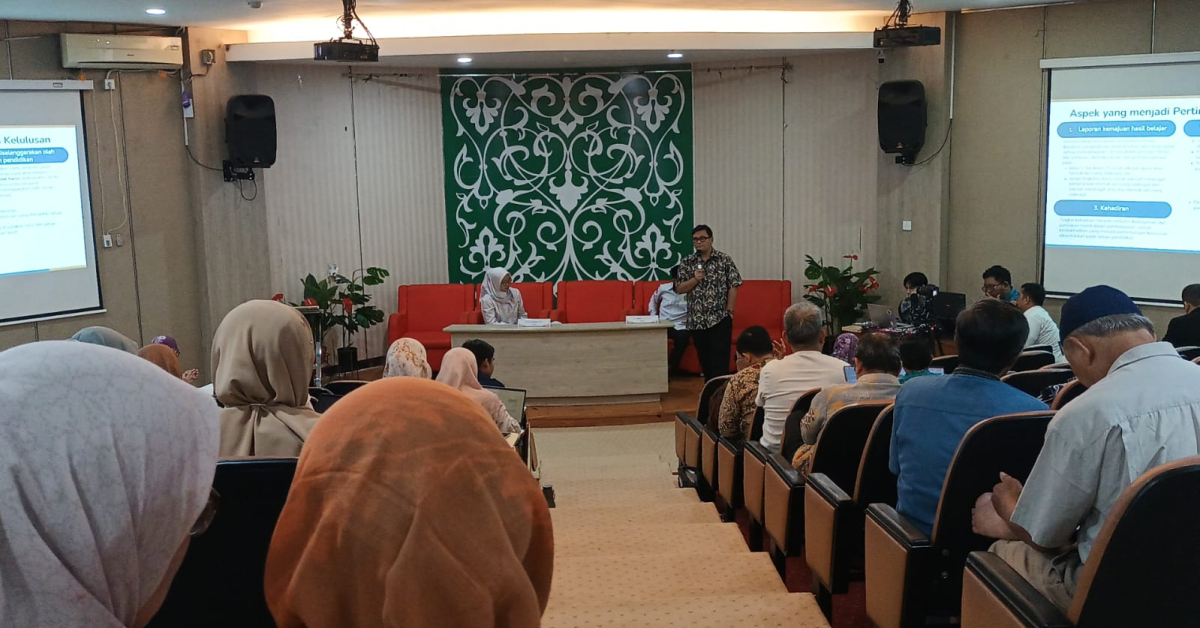Love-based Curriculum (KBC): UIN Jakarta, Kemenag, and Kemendikdasmen Discuss Educational Approaches
Jakarta, UIN Online News — The Faculty of Education and Teacher Training (FITK) UIN Jakarta conducted an academic forum entitled "Implementing a Love-Based Curriculum for a Peaceful World" at the FITK Building on Tuesday (August 19, 2025).
This conference includes prominent speakers from the Ministry of Education, Culture, Research, and Technology (Kemendikbud) and the Ministry of Religious Affairs (Kemenag) to establish a new trajectory for Indonesian education via a strategic dialogue platform called Love-based Curriculum (KBC).
Prof. Asep Saepudin Jahar, M.A., Ph.D., the Rector of UIN Jakarta, suggested that Islamic education should serve as a moral impetus for fostering global peace, founded on love as a kindness to humankind, by conveying a message of compassion, peace, and benefit to all sentient beings.
“We aim to cultivate love, empathy, and universal human values that are intertwined with Islam’s religious identity known as rahmatan lil-alamin,” he stated.
According to him, students must be cultivated into a generation characterized by integrity, virtuous ethics, and the capacity to employ knowledge in fostering a harmonious society.
"This curriculum emphasizes love, prompting students to internalize spiritual principles and embrace variety. Now, we are trying to teach them to serve as positive agents of societal change," he asserted.
Although this approach may seem utopian, Prof. Siti Nurul Azkiyah, M.Sc., Ph.D., the Dean of the Faculty of Education and Teacher Training, assured that the love-based curriculum remains achievable at UIN Jakarta.
“Love can actually be integrated into daily education—through the teacher's empathetic demeanor, cooperative strategies, and recognition of diversity within the classroom,” she argued.
During the forum, Dr. Yogi Anggraena, M.Si., from the Curriculum Center of the Kemendikbudristek, elucidated the new educational policy direction as outlined in Ministerial Regulation Number 13 of 2025, which also underscores deep learning, enabling students to possess both theory and practice.
"The introduction of elective courses in Coding and Artificial Intelligence (AI) commencing in the 2025/2026 academic year should not be taken for granted. Thus, we aim to cultivate a generation with critical and logical thinking to keep up with ethical standards in the digital world. Once again, education must remain relevant to global transformation," he conveyed.
Additionally, several new strategies, such as "7 Habits of Great Indonesian Children" to enhance co-curricular and extracurricular activities, will begin to be implemented by focusing on developing kids' creativity and reliability.
Zulkifli, M.Si., Head of the Madrasah KSKK Sub-Directorate, from the Ministry of Religious Affairs, underscored the necessity of establishing a love-based curriculum as a framework for education in Islamic schools (madrasah).
"These initiatives align with the KBC guidance from the Minister of Religious Affairs of the Republic of Indonesia, Prof. Dr. KH. Nasaruddin Umar, MA, who promotes universality and that harmony in existence must be founded on love," he said.
The implementation guide for the KBC seeks to cultivate qualities of empathy, tolerance, compassion, and responsibility within intra-curricular, co-curricular, and extracurricular education. Therefore, evaluation assesses not only academic success but also the practical application of love in everyday life.
However, the efficacy of KBC heavily relies on the cooperation of educators, school administrators, parents, and the community, as Zulkifli stated: "Education founded on love transcends theory; it embodies the practice of peaceful and mutually respectful coexistence."
This meeting signifies a crucial advancement in the collaboration of the government, universities, and policymakers to establish a more humanistic educational paradigm.
In this way, UIN Jakarta reaffirms its dedication to serving as a hub for the advancement of educational concepts and methodologies rooted in love, peace, and the sustainability of civilization.
"If love serves as the cornerstone of the curriculum, then schools will become the best place for nurturing our generations with compassion and tolerance," the Rector of UIN Jakarta concluded.
(Press release of the Information and Public Relations Center and LP2M UIN Syarif Hidayatullah Jakarta)

